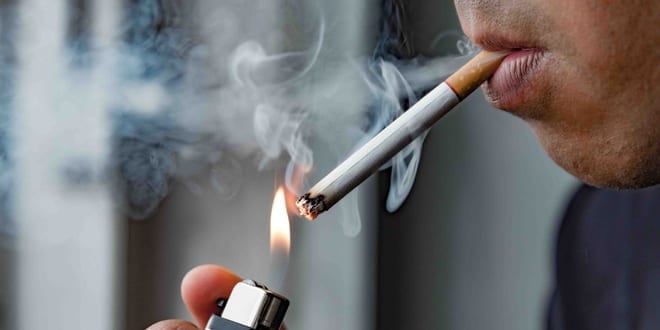Doctors, nurses, pharmacists, administrative workers, technicians and maintenance staff at medical centers around the world, including Israel, are working incredibly hard to save the lives of their patients. While doing so, they are endangering only their own lives not only from COVID-19 infection.
A new study, conducted online and published in the leading journal Nicotine and Tobacco Research’s special issue devoted to smoking and the pandemic, has found that being on the frontlines could negatively impact hospital workers’ mental health – even during lull periods and even for ancillary hospital staff, such as maintenance workers and administrative staff.
At Hadassah University Medical Center in Jerusalem, for example, more than half (59%) of hospital workers reported an increase in stress levels. Further, one third (35%) of those surveyed who were smokers noticed an uptick in the number of cigarettes they smoked each day during the coronavirus pandemic.
The research entitled “Changes in Smoking Behavior, Stress, and Sleep Duration among Israeli Hospital Workers during the COVID-19 pandemic: A Cross-Sectional Study,” was led by Dr. Yael Bar-Zeev and Dr. Nir Hirshoren at the Hebrew University of Jerusalem (HUJI)’s Braun School of Public Health and Community Medicine and Hadassah Medical Center, along with Lev Academic Center’s Dr. Michal Shauly-Aharonov and HUJI’s Prof. Yehuda Neumark.
They surveyed nearly 1,000 hospital workers between the first and second wave of the coronavirus. Of all the doctors, nurses, allied health professionals, administrative and maintenance workers surveyed, 132 were smokers.
Data collected included sociodemographic characteristics, smoking status, changes in smoking behavior (for smokers only), stress levels, and sleeping duration during the pandemic, perceptions of risk for COVID-19 infection and disease severity, presence of a chronic illness, COVID-19 exposure and infection status and involvement in treating COVID-19 patients.
More than half (59%) reported an increase in stress and 28% said there were reductions in their sleep duration. Thirty-five percent of current smokers reported smoking more. Increased stress was associated with an increase in smoking, and an increase in sleeping hours was significantly associated with a decrease in smoking. Among smokers who reported that their stress levels were the same or slightly higher than pre-pandemic, a strong inverse association was observed between sleep and smoking.
In contrast to similar worldwide studies that focused on stress levels among general populations during the early lockdowns, this new study focused on hospital workers during a relatively slow period between the first and second coronavirus waves, when the numbers of COVID-19 infections and deaths were low.
According to the research team, the study findings stress the need to provide mental health support for all hospital workers as part of the pandemic response, paying specific attention to smokers and those experiencing sleep disturbances.
“Many smokers won’t be receptive to cessation programs right now,” said Bar-Zeev. “However, as the pandemic shows no signs of letting up, health ministries [in all countries] and hospitals need to take the mental health of their employees seriously and provide stress-coping support for all their staff, even those not behind the gurney or with a scalpel in hand.”
The shortcode is missing a valid Donation Form ID attribute.




